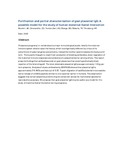| dc.contributor.author | Muchiri, JM | |
| dc.contributor.author | Omwandho, CO | |
| dc.contributor.author | Tumbo-Oeri, AG | |
| dc.contributor.author | Wango, EO | |
| dc.contributor.author | Roberts, TK | |
| dc.contributor.author | Tinneberg, HR | |
| dc.date.accessioned | 2013-06-10T05:46:34Z | |
| dc.date.available | 2013-06-10T05:46:34Z | |
| dc.date.issued | 2000 | |
| dc.identifier.citation | Afr J Health Sci. 2000 Jul-Dec;7(3-4):136-9 | en |
| dc.identifier.uri | http://www.ncbi.nlm.nih.gov/pubmed/17650040 | |
| dc.identifier.uri | http://erepository.uonbi.ac.ke:8080/xmlui/handle/123456789/30328 | |
| dc.description.abstract | Viviparous pregnancy in vertebrates is a major immunological puzzle. Ideally the maternal immune system should reject the foetus, which is antigenically different by virtue of its compliment of paternal genes and proteins. Instead the mother accommodates the foetus until term. This is partly thought to result from production of blocking antibodies, down regulation of the maternal immune responses and existence of a placental barrier among others. This report presents findings that antibodiess exist on goat placentae that could hypothetically block rejection of the fetal allograft. The total obtainable placental IgG was approximately 110Ug per term placenta. Analysis of eluate antibodies by SDS PAGE showed that placental IgG is approximately 214.4kDa and had a pI of 6.02. Trypsin digestion of acidified plantal microvesicles led to release of a 53kDa peptide similar to one reported earlier in humans. This observation suggest that certain placental proteins may be conserved across the mammalian species for reproductive purposes. We propose that goat placental IgG may be useful as a model for the study of maternal-foetal interaction during pregnancy | en |
| dc.language.iso | en | en |
| dc.title | Purification and partial characterisation of goat placental IgG: A possible model for the study of human maternal-foetal interaction | en |
| dc.type | Article | en |
| local.publisher | Department of Biochemistry, University of Nairobi, | en |

